Vision 2028
 Economic, Environmental and Socio-Cultural Impact Summary
Economic, Environmental and Socio-Cultural Impact Summary
“I have had the privilege of being part of the University of East London’s transformational journey over the last five years. We have remained true to our 1898 founding roots as West Ham Technical College, with a focus on unlocking opportunities for people from all parts of global society to reach their potential, guided by a clear vision to be a powerful force for positive societal change.
“UEL’s resolute focus on lifting up talent and tackling the world’s most pressing issues through innovation and research, means that its impact resonates not only within campus walls. Our work is also having a profound positive impact for the broader communities we serve. I continue to be inspired by the dedication of our staff and partners, to break new ground in social mobility and empower individuals to shape a more equitable and inclusive future, and in doing so, shining a light on just how transformational education can and should be.”
John Garwood Chair of the Board, University of East London

1
Introduced by Professor Amanda J. Broderick Vice-Chancellor and President
The University of East London (UEL) was founded 125 years ago this year, with a mission to help local people gain access to education in science, engineering, and the arts – providing emerging industries with skilled and creative workers from east London and empowering working-class men and women to gain a technical education that would once have been inaccessible.

2
Our origin as a ‘people’s university’ remains our ‘guiding star’, but within a new technological paradigm, a unique industry partnership approach and an increasingly global reach. Our innovative 10-year Vision 2028 strategy creates powerful impact, pioneering future careers and sustainable innovation for a changing world. The strategy’s success throughout its first five years has enabled the University to flourish and thrive in the continuous next.
Over the last 125 years UEL’s community has expanded enormously. A growing number of students are able to access our pioneering, skills-based education, and we help develop diverse talent from all around the world. UEL’s reach is now felt both nationally and internationally. Our diversity is one of UEL’s greatest strengths. Inclusion is not just an ambition, but a tangible reality on our campuses. Vision 2028 reflects the University’s commitment to unlock the unique power of our communities, to increase the diversity of the talent pipeline in a changing world.
UEL grows this talent through our flagship Mental Wealth and Professional Fitness curriculum, embedding social, emotional, physical and cultural intelligence development, together with digital proficiency, into everything we do. This curriculum is built into every course, at every level, to facilitate our graduates flourishing and thriving in a 5.0 economy. As we strive to become the country’s leading careers-intensive university, we are supporting the growth of a diverse talent pipeline by bringing together education, industry and students in a new education and skills social value partnership. We are challenging employers to move away from old-fashioned proxies for talent and supporting them instead to access, grow and keep the best talent, wherever it is found.
3
UEL’s distinctive approach to research has an emphasis on real-world benefits that impact both local and global communities. We pride ourselves on driving innovation in areas which tackle global challenges, including urban sustainability in cities and communities, reducing health and economic inequalities, driving social inclusion, and harnessing the power of new technologies. Our strategic institutional research priorities of sustainability and green tech, wellbeing and health tech, and cyber and social justice, align with the United Nations’ Sustainable Development Goals, reminding us of our wider global responsibilities.
For 125 years, UEL has demonstrated its resilience as an institution. The University has supported both our student body and wider community to overcome many challenges. Most recently, as the Covid-19 pandemic overtook the world, UEL once again showed its power as an anchor institution within east London, helping our students, local communities, and the NHS to overcome huge challenges. As these immediate challenges begin to pass, we look to the future to ensure we continue to make a positive difference to the communities we serve.
4
“UEL is working to improve the lives of future generations locally, nationally, and globally. As we celebrate our milestone anniversary, we look forward with vision and purpose to the next 125 years.”
Over the last five years, UEL has transformed as an institution. As we approach its mid-way point, Vision 2028 provides both the principles underpinning our success and a roadmap to continue to progress, evolve, adapt, and change. The success of this approach is increasingly evident: most recently we have been shortlisted for the prestigious Times Higher Education University of the Year Award 2023. We have also this year climbed 17 places in the Guardian University Guide; we ranked 13th for overall positivity compared to all UK institutions in the 2023 National Student Survey; and we ranked first for the number of care experienced undergraduates in the newly introduced Civitas/First Star Care Experienced league table, further underlining our commitment to inclusion.
The world doesn’t stand still, and neither will UEL. Our impact report seeks to do more than share the highlights of UEL in the present day. It aims to set out how UEL improves the lives locally, nationally, and globally of future generations. As we celebrate our milestone anniversary, we look forward with vision and purpose to the next 125 years.
Professor Amanda J. Broderick BA (Hons) PhD DipM DipMRS PGCTL FRSA MBGS FCIM PFHEA Vice-Chancellor & President
5
ECONOMIC IMPACT
GDP & GVA
Workforce impact
Growth and regeneration
IMPACT VALUE
ENVIRONMENTAL IMPACT
Reducing the carbon footprint
SOCI0-CULTURAL IMPACT
Research with impact
Increasing the carbonfree brainprint
Citizen scientists: co-creation, inclusion, access and knowledge exchange with community and public
Building carbon-free new economies
Socially responsible behaviours and practices
6
£814m The total impact of UEL on the UK economy.
£568m UEL’s direct and indirect economic output.
£245m The economic impact of UEL teaching and research.
£1 > £4.24 Every £1 of university income returns £4.24 to the economy.
1st UEL has reduced its CO2 emissions more than any other modern university.
1st UEL is ranked 1st in the UK for the number of care experienced undergraduate students.
6th UEL is ranked 6th in the UK for student enterprises.
2,500+ The number of active employer partners UEL works with.
160+ The number of nationalities represented by the UEL student community.
1st The 2023 Times Social Inclusion ranking placed UEL 1st in London for social inclusion and 12th nationally.
7
8
ABOUT THIS REPORT
To celebrate its 125th anniversary, UEL will be publishing an in-depth report covering the impact that its innovative Vision 2028 strategy has had so far. The report stands as testament to UEL’s glocal role, its commitment to sustainable economic development and social justice, and its significant impact on local communities, the UK economy, and the global stage. This summary offers highlights of that report, which measures impact in a number of ways – by examining and quantifying the University’s economic impact; measuring its civic footprint by looking at how UEL interacts with its various local and global communities; and by using case studies to show the breadth and depth of UEL’s research expertise.
This work has been supported by three impact frameworks (shown on the previous page), focusing on the actions and behaviours relating to the economic, environmental, and socio-cultural impact of UEL’s activities. UEL’s Vision 2028 strategy is also aligned with the United Nations’ Sustainable Development Goals. The seventeen SDGs are threaded through all of UEL’s impact.
9
UEL is ranked in the top quarter of institutions worldwide for impact on and commitment to the United Nations Sustainable Development Goals.
DIVERSIFYING THE TALENT PIPELINE
“The University of East London is a huge part of our community in Newham. It has been a privilege to work with the institution across my nearly 30 years as an MP. Throughout that time, I have seen first-hand its positive impact on the lives of students, staff and the citizens of east London. It has always been an enterprising, vibrant, and forward-looking institution, and the sheer breadth and quality of their impact is testament to that.

10
I campaigned for UEL’s Docklands campus – at the time the first new university campus to be built in London for over 50 years – which marked an important step in unlocking Thames Gateway redevelopment. Since then, the University has invested further in our local area, and is playing a vital role in building up Newham for the future. Its new partnership with Newham Council on the Stratford Youth Zone, for example, seeks to unlock untapped potential in the wider area as a vibrant hub for creative arts and culture, driving arts sector innovation with the community voice at its heart.
I chair the Work and Pensions Select Committee in the House of Commons; we’re concerned with increasing employment in the UK economy. UEL is equipping its students with the skills our economy needs, in order to secure for those students the best possible future. UEL’s leadership works hard to break down historic structural barriers and offer life-changing opportunities for students. The University has made great academic progress, turned its financial position around, and – as is increasingly clear – is determined to build on what’s been achieved and to redefine the boundaries of what is possible over the next 125 years.”
The Rt Hon Sir Stephen Timms MP for East Ham Chair of the House of Commons Work and Pensions Committee

11
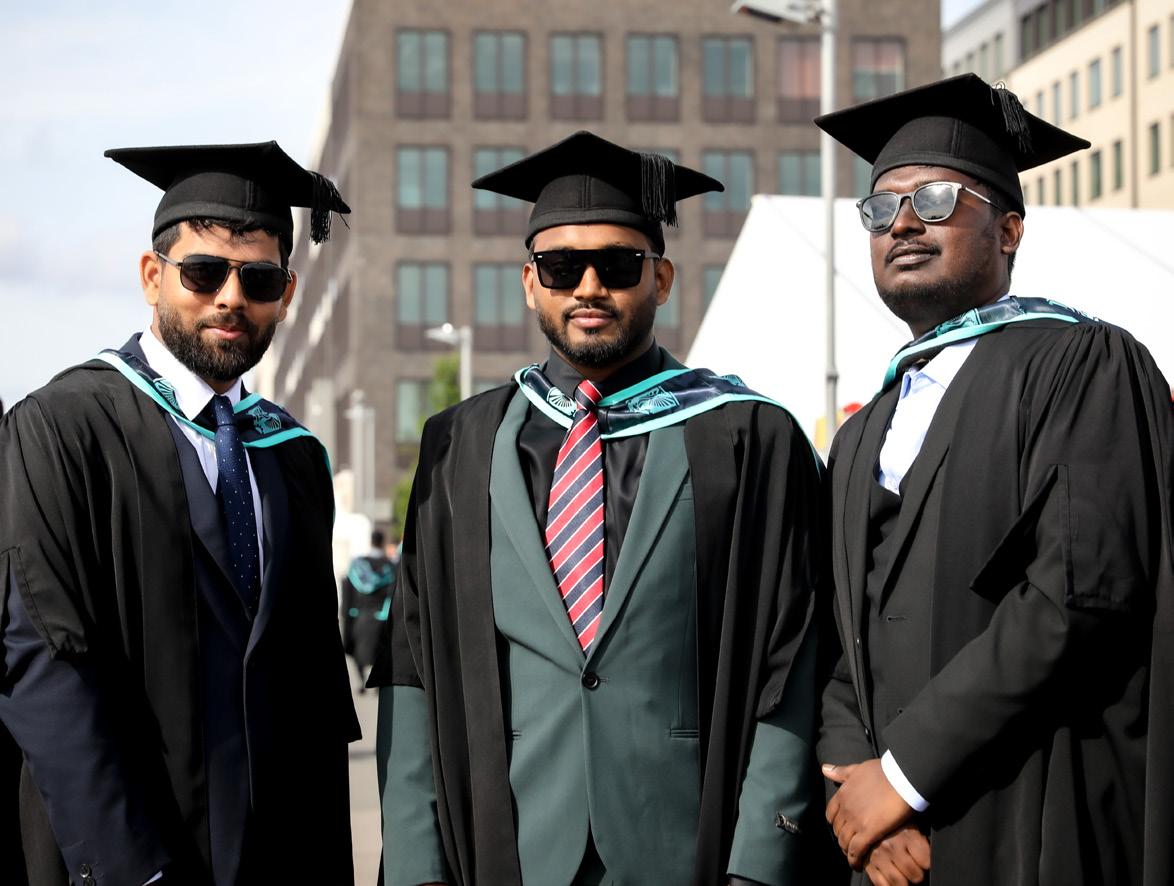
“The University’s focus on honing students’ creative and critical thinking skills, regardless of degree subject, sets UEL apart and will help ensure Britain has one of the world’s most talented workforces of the future.”
12
Robin Strup Vice President, Diversity, Equity & Inclusion
57% of UEL students are first in their family to attend university, and 75% of UK students come from households with multiple indicators of deprivation.
UEL was ranked 1st in the UK for the number of care experienced undergraduate students.
The turnover of UEL’s active graduate startups in 2021-22 was estimated at over £5m.
UEL’s 40,481 students represent over 160 different nationalities from across the globe.
UEL works with over 2,500 active employer partners, an increase of more than 830% since 2018.
13
“The students we recruited through the Diversity of Thought Programme really impressed us. They were intelligent, enthusiastic, and highly professional in their approach.”
 Simon Burgess Renewable Energy Project Developer, Siemens
Simon Burgess Renewable Energy Project Developer, Siemens
14
DIVERSITY OF THOUGHT
UEL’s Diversity of Thought Employer Partnership Programme is a vehicle for driving aspiration and social mobility, supporting progressive employers to evolve recruitment and retention cultures to replace old proxies for talent. The bespoke programme was co-created with partners including AWS, Siemens, ITV, WPP, Dataminr and MSG (New York), with a compulsory element of 121 mentoring, exposure to professional environments, workbased learning and action-oriented demonstrations. It is enabling students to build skills and – most crucially –social capital, and creating space for employers to radically reflect on the talent required to create future competitive advantage. To recruit students for these levelling-up programmes we use our ‘Talent Hack’, designed to allow students to shine and create dynamic connections with industry partners. Recent events have resulted in a rapid increase in paid internships with companies that our students had previously struggled to access.
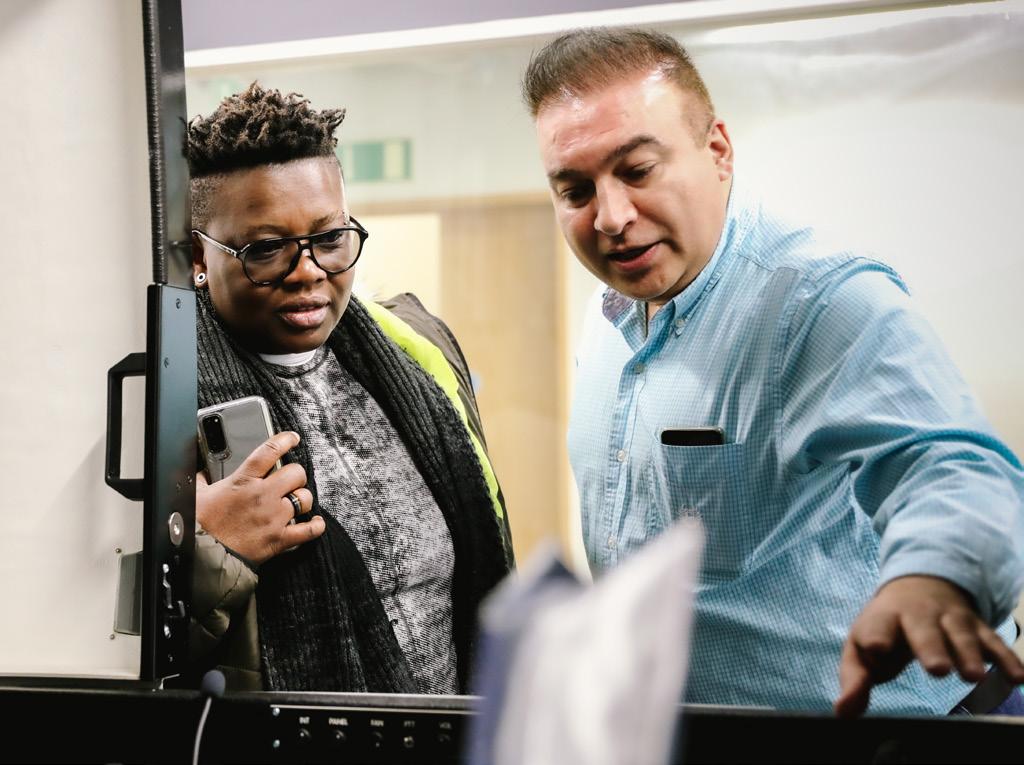
15
The 2023 Times
Social
Inclusion ranking placed UEL 1st in London for social inclusion and 12th nationally.
UEL is benchmarked as 1st in the UK for completion (% of university awards achieved, OfS 2023).
In the last three years, UEL has helped support 340 new student startups, creating 369 jobs – and is now ranked 6th in the UK for student enterprises.
UEL was awarded Best University Employer Engagement Strategy 2023 at the Institute for Student Employers Awards.
88% of employers said the overall quality of apprenticeships at UEL is at an excellent or good standard.
16
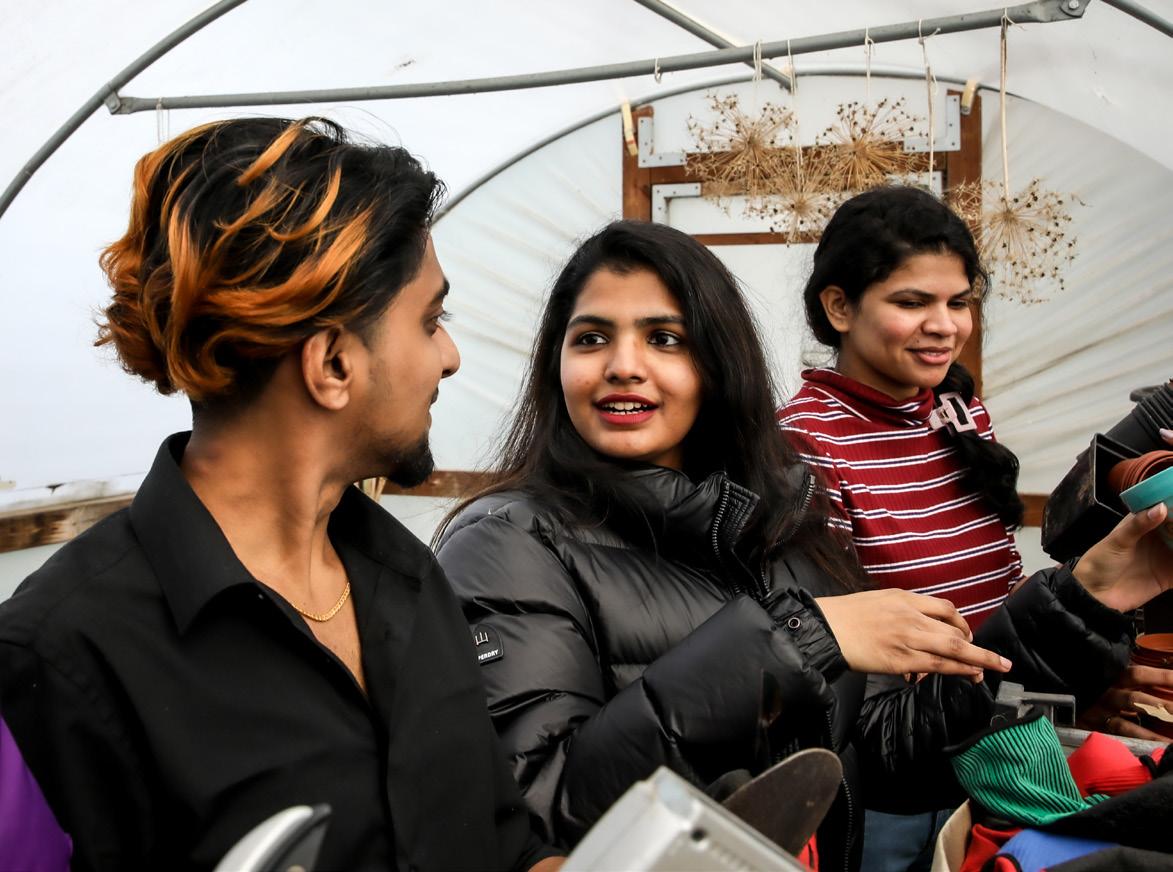
“We market and create advertising campaigns across the world and to do that we need people from all backgrounds offering authentic voices and varied life experiences. That’s why there is such synergy with the Diversity of Thought programme and the demographic of UEL.”
17
Michael Ludlow Director of Talent
A GLOCAL GATEWAY
“Universities are much more than education providers. While ensuring first-class pedagogy and pastoral support for their students rightly remains a core priority, Britain’s universities should be much more widely recognised for their critical importance as economic – both local and national – powerhouses, and engines of social mobility, as well as the research and development innovation for which the UK rightly has world renown.
UEL’s impact report helps elucidate how universities can and do help tackle some of the country’s – and world’s –most complex challenges. The University of East London’s prescience in 2018 has enabled it to lead the way in working

18
with industry to tackle both the current UK skills gap, and identify those skills needed into the future. Through its unique approach to industry collaboration, it is harnessing the drive and innovation of talented students from across the international social spectrum, equipping them with the skills and confidence to allow them to chart their own prosperous futures while giving employers a competitive edge.
While it remains an institution clearly rooted in and committed to supporting east London and the UK as a whole, the University is unlocking the power of education and knowledge creation across geographical boundaries. I have long been a passionate advocate for the significant benefits international students bring to the UK. I very much welcome the clear evidence in this report, that UEL’s planned growth and ongoing diversification of its student body is a vital component of its positive impact – socially and culturally, as well as economically. International students provide a cultural cross-fertilisation that benefits everyone, while attracting top student talent globally offers clear gains in innovation, research and a broader skills base.
I congratulate UEL on how far it has come over the last five years, led by its forward-thinking Vision 2028, underpinned by a drive for social justice which dates back to its origins as ‘the people’s university’. I have no doubt that the University and its global family will continue to thrive whilst driving pioneering solutions and social mobility worldwide.”
Lord Jo Johnson International Higher Education Commissioner UK Minister for Universities and Science (2015-18 & 2019)
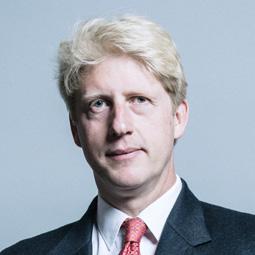
19
The University of East London contributed £814 million to the UK economy, including £245 million in teaching and research impact.
Every £1 of university income returns £4.24 to the UK economy.
UEL has a growing community of over 12,206 international students. It is a top destination for students from India and has the 2nd largest population of Indian students of any UK institution.
UEL supports 3,545 jobs across the UK, including 2130 in London.
In the past three years, UEL has invested over £2 million in regeneration funding, primarily in east London.
UEL has academic partnerships with 27 institutions in Europe, Africa, the Middle East and Asia, attracting 18,846 students to study as part of its transnational education.
20
STRATFORD YOUTH ZONE
In 2023, UEL launched a partnership with the London Borough of Newham to work on the Council’s flagship Stratford Youth Zone – injecting a £733,000-a-year investment to support creative and performing arts opportunities for young people in Newham. The Youth Zone will offer a range of programmes and activities for young people with a focus on drama, music, dance, and digital arts.
UEL will support young people in Newham through work experience, mentorship, internships and industry placements, and its arts students (numbering 2000) will run education workshops in the zone. The project will also draw on the insights and expertise of UEL staff, who have substantial experience as practitioners and cultural producers and are able to share their knowledge so students not only become experts in their chosen disciplines, but also understand how to succeed in and sustain a career in the creative industries.

21
A GLOBAL BLUEPRINT FOR URBAN SUSTAINABILITY
Bold ideas and brave approaches are needed if the UK is to continue to lead the way on tackling climate change and take full advantage of the opportunity to create a green economy.

22
As centres of innovation and cross-disciplinary expertise, universities are the obvious place to look for solutions for complex challenges. The University of East London recognised that over 20 years ago by creating the UK’s first Sustainability Research Institute. But UEL is now helping to show how universities can unlock the power of cross-sector collaboration to deliver the progress needed in the green revolution and race against climate change.
UEL and Siemens are partnering to champion urban sustainability, achieve net zero on UEL campuses by 2030, develop a unique Living Lab for real-time and real-world teaching and research, and co-create new future-focused degrees. The partnership was recognised with the Net Zero Leader Award at the Decentralised Energy Awards 2023 and is fast becoming an exemplar of how to combine an institution’s own expertise and drive with that of a likeminded industry partner, to help deliver a goal of global importance.
The University’s commitment to drive sustainability in all areas is visible and vocal, threaded throughout its practice, teaching and learning, and institutional culture, aiming to empower staff and students to be champions of sustainability, and develop the skills and innovation needed for a green economy. By embedding sustainability into courses, by making the UN’s Sustainable Development Goals central to research projects, by offering reallife sustainability projects, and by expanding industry experience opportunities, UEL is proving its dedication to making a positive impact on society and the planet.
23

“Working with UEL is very inspiring – they have a strong sustainability strategy, students who live the values of the university, and a great leadership team embracing it. And this gives us a purpose and an energy that powers our work together.”
24
Björn Burbach Partner Digital Transformation
UEL has worked with more than 250 small and medium enterprises in the East of England to increase production and local consumption of renewable energy.
UEL is in the top 50 universities for the lowest CO₂ emissions. UEL has reduced its CO₂ emissions and energy consumption more than any other modern institution in London.
UEL research is helping to deliver the technological change required to achieve net zero locally and globally – including helping to cut emissions through optimising the energy efficiency of data centres.
UEL had the 3rd largest reduction in water consumption across all London institutions, and is in the top 3 producers of renewable energy when compared with other modern institutions in London.
25
INNOVATION, TEACHING AND RESEARCH
“The healthcare sector needs skilled staff if it is to fight inequity and improve lives; as a former health minister and nurse, I know the importance of a well-trained workforce in this battle. UEL is a vital partner in addressing this need, educating more than 2,200 students in health science subjects since 2018. Many UEL graduates trained in its

26
£10m Hospital and Primary Care Training Hub, a European first in end-to-end healthcare education which includes a simulation suite equipped with the latest augmented and virtual reality equipment. It is no surprise that the Hub was shortlisted for Technological or Digital Innovation of the Year at the 2023 Times Higher Education Awards.
The University’s impact in tackling inequalities is a powerful combination of experiential place-based teaching and learning, and through its research. Whether in the Institute for Connected Communities’ work on social prescription, or the pioneering research led by the Baby Dev Lab, UEL research is being directly applied in healthcare settings, schools, and nurseries to have real-world impact.
Genuine and sustainable collaboration will drive the radical solutions needed to shift the dial on complex issues, and UEL’s partnership work in both health and early childhood, are examples of how UEL is reimagining the role of higher education. I urge UEL to continue its drive to shape a healthier and more equitable society.”
Ann Keen

RN NDN FRCN FQNI FAAN
MP for Brentford and Isleworth (1997-2010)
Parliamentary Under Secretary of State for Health Services (2007-2010)
27
Our nursing course has grown student numbers by 1500% since 2018, so now 1 in every 12 Adult Nursing students in London is studying with UEL. Pioneering work in social prescribing has helped train a network of 1000 volunteers to provide support on improving health outcomes.
On average, UEL trains 325 teachers every academic year.
UEL’s Baby Dev Lab has received £3.2 million in external funding since 2019, including from the European Research Council.
In the past five years, UEL has educated over 2,200 students in health sciences subjects – over 50% of which are in subjects directly aligned to medicine.
UEL is part of a £5 million project to boost research into health inequalities in the London Borough of Tower Hamlets.
28
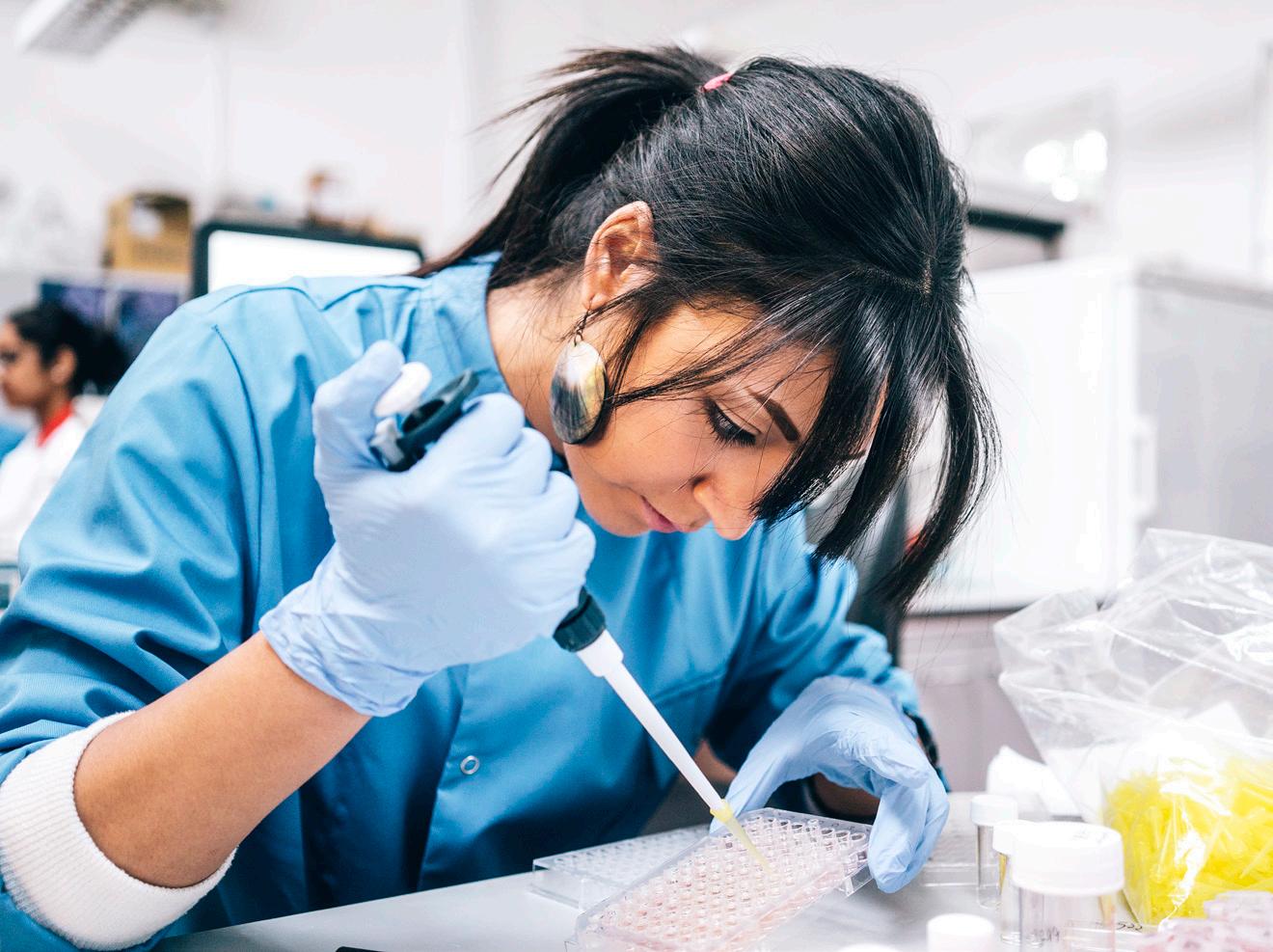

“The University of East London has made a significant contribution to building the social prescribing movement across England.”
29
Bev Taylor Operations Director


“In Newham and around east London, UEL’s reputation is very strong. By reputation alone, it’s a good enough reason to work with UEL above anybody else. But the fact that it’s been in east London for 125 years, it knows east London better than any other university – that’s the unique selling point.”
30
David Bailey Director
Since 2021, the Office for Students has awarded UEL £8.3m in funding to develop the Hospital and Primary Care Training Hub, with the University contributing a further £2m in capital funding.
UEL healthcare students are helping solve local NHS workforce challenges, pioneering new approaches to healthcare in diverse communities.
UEL’s Hospital and Primary Care Training Hub has been shortlisted at the Times Higher Education Awards 2023 for Technological or Digital Innovation of the Year.
UEL research has reached over 50,000 early years practitioners in 2000 primary schools, leading to substantial changes in early years teaching environments to support learning and development.
31
COMMUNITY AND INDUSTRY ENGAGEMENT
“The University of East London’s Vision 2028 Impact Report serves as a testament to the unwavering commitment of the institution to inspire positive change and catalyse transformative initiatives in the pursuit of knowledge, progress, and societal betterment.
I have spent my career working to ensure that the spirit of innovation translates into sustainable impact. I believe that the key to this sustainability is a holistic approach,

32
which recognises that none of us can succeed in isolation. UEL recognises this too and prioritises partnership to guarantee that the innovations of today and tomorrow won’t leave anyone behind.
I was delighted to officially open the University’s Centre of FinTech in 2022. The Centre’s work is a leading example of the application of this holistic approach to an area ripe for innovation, which I argued was vital in my review of the UK Fintech sector commissioned by the Government in 2020. UEL is establishing an enviable reputation for its work in this area, harnessing the latest data to inform strategy, contributing to the regulatory policy agenda, supporting start-ups to thrive, and attracting global talent to the UK.
The University’s worldwide reach does not come at the expense of local communities, however, and UEL remains an invaluable anchor institution in east London. The way that UEL interacts with and invests in local communities is inspiring – particularly its work in the sporting arena.
Our world is evolving, but to ensure that it does so for the better, we must effectively prepare ourselves and others for the changes that await us. UEL is perfectly positioned to do this, understanding the need for innovation, but also the importance of history, and the complex needs of the people and communities it serves.”
Sir Ron Kalifa OBE

33

“We are excited by the prospect of complementing the University of East London’s Sport in Your Futures programme with Team GB assets, helping to provide a clear link between grass-roots and Olympic sport in the UK.”
34
Jamie Piggins Company Secretary
In 2022/23, over 1,500 primary aged children from 20 local schools have taken part in UEL’s innovative outreach programme, Sport In Your Futures.
80 young athletes are engaged in the Sport Englandfunded East London Sport Talent Pathway pilot.
UEL has a growing research strength exploring how to best utilise the technologies of the future, including projects recognised as ‘excellent’ by the European Commission.
UEL researchers conducted the largest survey of youth cybercrime in the EU ever undertaken with 8000 respondents in 8 countries.
Since making off-peak gym membership free to students, UEL has seen an 800% increase in the number of students using SportsDock facilities.
35
UEL athletes excel on the national stage – if UEL were a country in the 2022 Commonwealth games, it would have placed 20th out of the 40 countries that medalled.
UEL has received over £1.4million in research funding to study youth cybercrime and child online harms in the UK, EU, and Africa over the last 3 years.
In UKRI’s Knowledge Exchange Framework, UEL’s ‘very high engagement’ placed it in the top quintile for public and community engagement.
UEL is one of 30 universities selected as part of an Office for Studentled programme delivering postgraduate level conversion courses in AI and data science.
36

“The magic of working with UEL is the way they understand the needs of their local community. We have worked in partnership to create and pilot a placebased approach to talent development that we now hope will provide a nationwide blueprint for city-based talent recruitment and development.”
37
Hannibal Morris Head of England Talent Development Pathways
THE NEXT 125 YEARS…
UEL’s story is one of resilience, innovation, and transformation.

38
The original West Ham Technical Institute – the “people’s university” – was open for only a year before it burnt down in 1899. But, like the phoenix which now sits on UEL’s crest and logo, the Institute was rebuilt from the ashes to continue its mission of educational empowerment. This was the first of many instances of radical transformation in UEL’s institutional history, capturing the spirit of a university that always seeks to evolve in the face of extraordinary challenges to serve its communities. That spirit continues to underpin everything UEL does today.
Yet today the University’s ambitions and activity, though rooted in that same spirit, also extend beyond it. UEL is still a local anchor institution, but also now has global reach; it is still providing the skills students need for our current moment, but is also working with employers to make sure courses prepare graduates for the jobs of the continuous next.
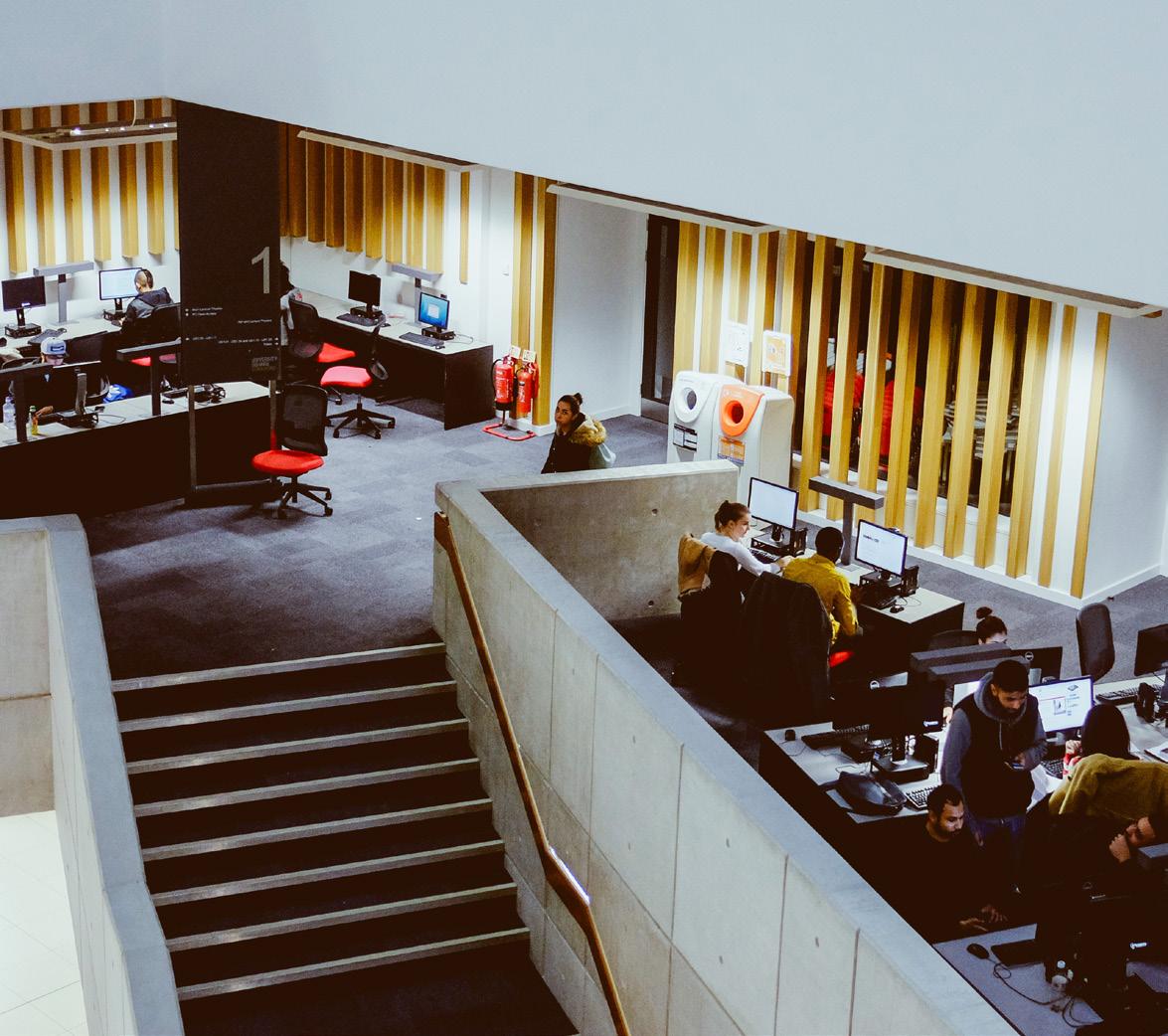
39


40
“Our world is evolving, but to ensure that it does so for the better, we must effectively prepare ourselves and others for the changes that await us.”
UEL does the work it does because it wants the world to change, with the hope that one day the old proxies of talent that have dominated industry for so long will be consigned to history. UEL believes that it is diversity –of people, of thought, of ambition – that can solve the unprecedented challenges we will all face over the coming century. It’s not just a platitude to say that UEL is breaking down barriers to work and education – it’s at the core of the University’s mission.
The story of UEL’s impact is itself testament to the institutional transformation that has taken place since implementing our innovative Vision 2028 strategy. Every day, the University is working to provide a socially-just education that is life-changing for students and graduates; to unlock diversity in the talent pipeline, while helping to evolve culture and recruitment practices with top employers; and to create a 5.0-ready, green and healthy world with and for the communities it serves.
As UEL celebrates 125 years of impact, it remains mindful of how that impact has changed over this time. None of us knows what will constitute that impact in another 25 years, let alone 125. Staff, students and stakeholders are only custodians of this institution, which will continue to transform lives long after they have left it. In the meantime, every member of UEL’s communities can be proud of the part that they are playing in having impact now.
41
APPENDIX: METHODOLOGY
Our Economic Impact was calculated by London Economics by estimating direct, indirect, and induced effects associated with operational and capital expenditures.
Direct effect is derived from Finance and Staff data provided by HESA which had been returned by the university to the relevant data agencies and undergone their validation and publication processes. The data items used include capital expenditure, operational expenditure (including staff and non-staff spending) and FTE of staff employed to consider the economic output generated by the university by the purchase of goods and services (including labour) from the economy.
Indirect effect is derived from a multi-regional InputOutput analysis undertaken by London Economics which uses Office for National Statistics tables measuring total production output of industries in the UK economy and the flows of goods and services. These tables are combined with further regional-level ONS datasets to achieve granular region and sector breakdowns. 2019 is the latest year for which the Input-Output tables are available.
Induced effect is a further measure of the ripple effect of the institution’s economic impact, based on the same InputOutput tables and the assumed wage income spending which the university generates in its status as an employer.
Impact is measured in terms of economic output (operational and capital expenditures combined, excluding depreciation and amortisation costs and movements
42
in pension previsions); Gross Value Added (GVA) (sum of employment costs, surplus on operations, interest payable and depreciation and amortisation costs); and FTE jobs supported (rounded to the nearest 5 Full Time Equivalent jobs).
Our Teaching Impact and Research Impact were calculated by Public First. Teaching Impact is calculated by subtracting the value of tuition income from the value of earnings uplift for the 2021/22 starting cohort. This is based on Institute for Fiscal Studies (IFS) analysis of Longitudinal Employment Outcomes (LEO) data in 2018, uprated in line with inflation. This analysis includes both UG and PG students and is apportioned in line with the UK’s graduate employment rate and the number of graduates that stay in the UK. Research Impact is calculated by the value of the investment in Research & Development and the return on that investment and assumptions derived from Treasury ‘Green Book’ advice on appraisal of policy, programmes, and projects. The initial financial figures are as published in UEL’s annual financial accounts.
NB: The analysis of the direct, indirect, and induced expenditure includes the expenditure undertaken by the University of East London resulting from income received from tuition fees and education contracts, funding body grants, total research grants and contracts, total ‘other’ income, investment income, and total donations and endowments. However, there is no direct mapping between university income and expenditure, so the expenditure associated with research grants and contract income was not able to be removed from the subsequent analysis. As a result, there might be a relatively small overlap (comprising approximately 1% of total institutional expenditure) between the direct, indirect, and induced economic impact associated with university expenditure and the estimate of the economic impact associated with research activity.


43
For more information regarding the full version of this impact report, the methodology used, or the sources cited, please email publicaffairs@uel.ac.uk.
For a playlist of videos exploring some of the case studies mentioned in this report, scan the following QR code:

Docklands Campus
University Way
London
E16 2RD
University Square
Stratford
1 Salway Road
London
E15 1NF
Stratford Campus
Water Lane
London
E15 4LZ
uel.ac.uk universityofeastlondon @UEL_News instagram @universityofeastlondon
@universityofeastlondon
44
 Economic, Environmental and Socio-Cultural Impact Summary
Economic, Environmental and Socio-Cultural Impact Summary






 Simon Burgess Renewable Energy Project Developer, Siemens
Simon Burgess Renewable Energy Project Developer, Siemens























